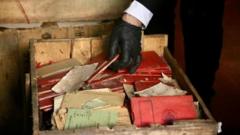In a remarkable rediscovery, workers at Argentina’s Supreme Court uncovered wooden crates filled with documents tied to Nazi Germany while clearing out the building’s basement in preparation for moving its archives to a new museum. This unexpected find, reported last week, included membership booklets from Nazi-affiliated organizations and propaganda materials destined to promote Adolf Hitler's ideologies within Argentina during World War II.
According to court officials, the boxes had originally arrived in Argentina on June 20, 1941, via 83 diplomatic pouches aboard the Japanese steamship Nan-a-Maru. The German embassy in Tokyo had asserted the pouches contained "personal effects." However, Argentine customs officials felt a sense of caution regarding the extensive shipment, suspecting it might jeopardize the country's neutrality in the ongoing global conflict. Random inspections of five bags revealed postcards, photographs, and other Nazi propaganda, prompting an order from an Argentine judge to seize all 83 pouches in September 1941.
The crates remained in the Supreme Court unchecked until their recent discovery, as legal and political deliberations following the war delayed any further action. Expert historians are now examining the documents, aiming to uncover insights into the financial networks and international connections of the Nazis.
Upon the crates' rediscovery, court officials moved the artifacts to a secure location and contacted the Buenos Aires Holocaust Museum for assistance in inventorying the contents. The documents and photographs revealed thus far embody a chilling look into the mechanisms of Nazi influence in Argentina, highlighting a somber chapter in the nation's past.
Following World War II, Argentina became a refuge for numerous high-ranking Nazi officials, including notorious figures such as Adolf Eichmann and Josef Mengele, even as the country struggled with its wartime sympathies. In 2000, the Argentine government issued an official apology for its historical role in shielding Nazi criminals, an acknowledgment that resonates more powerfully with the recent findings. This rediscovery may lead to further exploration of Argentina's entanglements with the Axis powers during a tumultuous period in history.



















